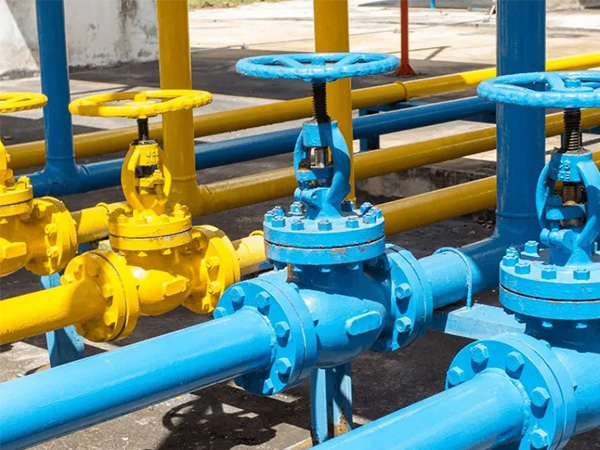Harm and protection of abnormal pressure boost in gate valve

Gate valves usually have single gate, double gate, wedge, parallel and other structural designs, in which wedge double gate (Z42, Z62 series) and wedge elastic gate (Z40, Z60 series) are the most widely used, the former is closed, the gate automatically fits both sides of the seat, automatically compensates the wedge Angle processing position error; The latter relies on the elastic groove in the middle of the gate and compensates the machining position error of the wedge Angle by the axial thrust of the valve stem, both of which achieve a better sealing effect. It is precisely because of the excellent sealing on both sides that in some cases the pressure in the middle cavity will rise abnormally. That is, when the high temperature and high pressure fluid (liquid or gas) is blocked in the middle cavity of the valve, if the temperature of the upstream fluid increases, the flow in the middle cavity will be increased synchronously by heat transfer. Since the volume of the middle cavity cannot be expanded, the liquid may quickly vaporize when the fluid in the middle cavity is blocked from cold state to hot state. Resulting in a sharp increase in pressure, often in a geometric order.
The consequences of valve overpressure work are very serious. When the valve cavity is abnormally boosted, the working stress of the pressure parts and the opening and closing parts (such as the use of the stress of the valve stem and the ram frame) will increase sharply, the driving force of the driving mechanism will be overwhelmed, and even cannot be started, and the valve stem will be broken, the ram frame will be broken, and the motor will be burned out. These phenomena are common in many high-pressure large-caliber gate valves. Many users often complain that this is the gate "bite", in fact, the real reason for "bite" is often the abnormal pressure in the middle of the "invisible killer".
Typical cases such as Z962Y series wedge double gate valve used in thermal power plant water supply system and its bypass, such valves are generally closed after cold water pressure test, when the unit starts the system temperature rises to 250~300℃, due to the sharp rise in temperature, the cold water temperature in the middle of the closure will rise sharply and vaporize, so that the fluid volume increases and the pressure rises. At this time, if you want to open the valve, either the driving torque is large enough, or the strength of the valve stem assembly is high enough, otherwise the valve stem is often broken, the gate frame is broken, the gate T-groove is blooming and broken, so that the feed pump can not start, resulting in serious furnace shutdown accident.
The harm of abnormal pressure boost
The formation of abnormal pressure boost in many gate valve applications will occur surprisingly similar, because the two major elements of its occurrence are similar in many industrial systems, that is, the system medium after the boot, from cold to hot; The ram closes in cold and opens in hot. Therefore, if no measures are taken to the system, the damage of the abnormal pressure boost to the system is almost inevitable, which has three aspects of harm:
(1) Damage to the valve itself
The strength of the valve shell, valve cover and valve stem parts is generally designed with the nominal pressure of the valve. When the abnormal pressure is raised, the opening pressure will be doubled, resulting in the use of related parts of the stress will be doubled, when the actual stress of the material exceeds the allowable stress, the high stress part will be broken, resulting in the valve can not be opened, the valve will be damaged or scrapped.
(2) Damage to system security
Obviously, the shell, valve cover and other pressure parts overpressure is very dangerous, once the overpressure of its weak parts may first perforate, causing the medium to leak out; The packing and self-sealing ring parts are often washed out by high pressure fluid, causing a large amount of media leakage. When the medium is high temperature gas, toxic gas, harmful gas will be more serious, and even cause damage to equipment and personnel.
(3) Great loss to the production control process
The normal opening and closing of the valve is the key to the control of various industrial processes. Once this control cannot be achieved, the system will be shut down for maintenance, which will cause huge direct or indirect losses.
Protective measure
Starting from the aspects of design, installation, debugging, etc., it is completely possible to fundamentally eliminate the abnormal boost in the middle cavity, and three sets of commonly used schemes are summarized for the reference of the majority of users:
(1) Pressure relief holes are opened inside the valve
The fundamental solution to the abnormal pressure boost in the middle cavity is to balance the pressure in the middle cavity, and opening a pressure relief hole is the most economical and effective solution. The pressure relief hole is set up in the outer circle of the upstream side ram and the inlet side seat. When the pressure in the middle cavity rises, the pressure in the middle cavity will automatically release to the upstream side, and the pressure in the middle cavity will always be equal to the upstream side pressure, so as to avoid the occurrence of abnormal pressure boost.
(2) Valve installation external bypass pressure relief
The external bypass and peripheral pressure relief valve can be used to reduce the pressure in the middle cavity. The peripheral bypass with a stop valve can be used to connect the middle cavity and the upstream side. The stop valve can be closed after the main gate is closed (depending on the temperature change in the middle cavity, it must be opened when it is too high). When opening the main gate valve, the bypass stop valve should be opened first, and the pressure in the middle cavity should be reduced before starting the main gate valve.
(3) Special pressure relief valve is installed outside the valve
A pressure relief valve is set outside the middle chamber of the gate valve to control the pressure range, set the discharge pressure of the pressure relief valve to the rated working pressure of the main valve, and automatically discharge to the set pressure when the middle chamber overpressure, so as to maintain the safe operation of the main gate valve.
The stop valve is installed before the pressure relief valve to facilitate the adjustment and maintenance of the pressure relief valve. The pressure setting of the relief valve can usually be considered as 1.33PN (PN is the nominal stress of the system valve).
In addition, when commissioning the valve, especially when commissioning the electric valve, attention should be paid to the control of the closing stroke and torque, and the closing torque should be reduced as much as possible to prevent the wedge from dying; The high temperature valve should consider the wedge death caused by the thermal expansion of the valve stem at high temperature. It is recommended that when the high temperature and high pressure large diameter gate valve is debugging, the valve stem should be properly backed up after the gate is in place to avoid the real biting accident.









 +86-021-67895388
+86-021-67895388 shghfmc@163.com
shghfmc@163.com  93862333
93862333